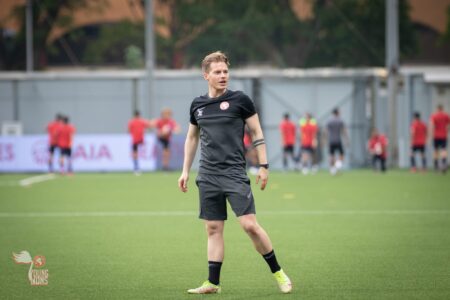
Being a student athlete means dedicating your entire university life to managing not only your studies and personal life but also your training sessions.
You’d probably be awake from 5 a.m. just to attend training sessions, and find yourself burning the midnight oil just to complete assignments.
For Malaysian beach volleyball student athlete Tasha Mae, it’s her calling. “I love being on the move and doing something productive,” she shares. “Honestly, I thrive in this environment.”
However, pursuing her dream of becoming a beach volleyball athlete is almost impossible in Malaysia, where the sport is overshadowed by the much more popular badminton, squash, and football.
To continue being a student athlete, Mae had to leave.
Brain and brawn drain
Sports isn’t a prioritised industry in Malaysia — in fact, it’s underfunded, especially women’s sports.
In 2022, women’s futsal and 10-metre platform diving were removed from the Malaysia Games (Sukma) due to a lack of participation. Later on, several sports, including women’s karate, weightlifting, canoeing, and men’s boxing, were removed too, the Malay Mail reports.
This prompted Malaysia’s Youth and Sports Minister, Hannnah Yeoh, to state that state governments should not overlook funding for sports during a press conference.
This isn’t fresh news to Mae. She has been playing volleyball since she was 10 and even represented Malaysia in the Southeast Asian Games.
View this post on Instagram
Throughout the years, she has seen and experienced how sports are viewed and treated in her home country — and even the politics that accompany it.
“I love volleyball so much that I want to pursue it to the highest level, but the sport itself isn’t well known in Malaysia, and there’s a lot of politics that demotivated me for a bit,” Mae says.
“But when I participated in the SEA games in the Philippines, I learnt about collegiate sports in the US and that made me realise it was what I wanted.”
That was her answer to her doubts.
In 2021, Mae made her way to the US to chase her dreams of becoming a volleyball athlete at Irvine Valley College (IVC).
She spent a year at IVC and later transferred to California State University, Northridge to pursue a BA in Psychology and train in beach volleyball.
“This was the best thing I’ve ever done, and I learnt so much that I transformed into a new athlete,” Mae gushes. “Training here is so different that it reminded me why Malaysia is behind in sport, and it’s because of how we approach it.”
View this post on Instagram
The philosophy varies from country to country.
“In Malaysia, or any Asian culture in general, punishment is a common thing, and it’s often used in training for sports,” says Mae. “If you make a mistake, you must run or do push-ups. But what’s the point? Why are you punishing kids? It isn’t a productive way of training student athletes.”
In the US, however, this wasn’t the case. The philosophy is deeper.
“They strive to always make you understand why you’re doing this and how you can apply certain things to improve yourself,” she says.
Besides, with the small pool of beach volleyball players in Malaysia, it would have been impossible for Mae find teammates to train with.
And that would make participating in bigger competitions harder.
By choosing a US university, these were no longer problems.
She would be far from home and family, but she could be a student athlete — an acceptable compromise.

Mae is the host for The VolleyTalk Podcast and a beach volleyball player for Team Malaysia. Source: Tasha Mae
Here’s what a full-time volleyball student athlete does in a day
Being a student athlete means your day starts early — for Mae, at least.
“We train for two hours in the morning, and once we’re done, we’ll head over to the gym for an hour. Everything we do in the morning, including preparation, can take about four to five hours,” she says.
Yet, the day still isn’t done.
After training, Mae would head home for a quick shower and meal, and if there’s time, she’d sneak in a little nap.
Mae’s classes are conducted in the afternoon, allowing her to train in the mornings without worrying about whether she can make it to classes.
That’s not all; she also has to schedule time for meal prep, shopping for groceries, and completing her daily chores.
On some days, she would have to find time to attend school events and meet friend too.
Despite her packed schedule, she lives for it.
“Honestly, I thrive in this environment,” Mae says. “I love being on the move and doing something productive. Funnily enough, when I have nothing going on, I’d think, ‘What am I doing? Why don’t I have anything to do?’”
Mae knew that adjusting to life as a student athlete in the US would not be a problem; in fact, she had found it easier being a student athlete in the US, especially in her academics.
“Academics in Malaysia are very much test-heavy and involve a lot of memorisation, but in the US, as long as I understand the concept, I’ll be fine,” she laughs. “And the work given in the US is mostly coursework. I pay attention in class and always ask professors many questions so I can understand it immediately.”
View this post on Instagram
If you’re thinking about becoming a student athlete in the US, here’s some advice
As simple and easy as Mae makes it out to be, again, being a student athlete isn’t easy. But that doesn’t mean you shouldn’t pursue your dream of becoming one.
Here’s what it takes for you to become a student athlete:
Dedication and a deep passion for the sport
When you have to show up, you show up — especially if you want to go pro.
“When you’re dedicated to something, you’ll find the time to improve and work your life around it,” Mae shares.
View this post on Instagram
A good support system
Being a student athlete isn’t about the “me, myself, and I” life; you’ll need people who will be there to help pick you up when you’re done and push you to reach your goals.
“Playing a sport isn’t just about you, but also about your teammates and coaches,” says Mae.
“I’m fortunate to have amazing coaches and teammates to support me. I’ve seen athletes who weren’t that lucky that they got screwed over and burnt out, that quitting was the only option.”
Accountability
Being a student athlete means you must claim your wins and losses, and a lot of disappointment comes with it.
Accountability is one of the most crucial needs for becoming a successful student athlete, especially when playing a team sport.
“It’s not just about you, it’s about your teammates too,” says Mae.
A positive mindset
There will undoubtedly be setbacks as a student athlete, and that can often take a toll on your mental health.
“While not easily achievable, having a positive mindset is key,” says Mae. “It will get you through most things, especially injuries and losses. It will also build a positive team dynamic. It will also help you not to give up on your dream.”










